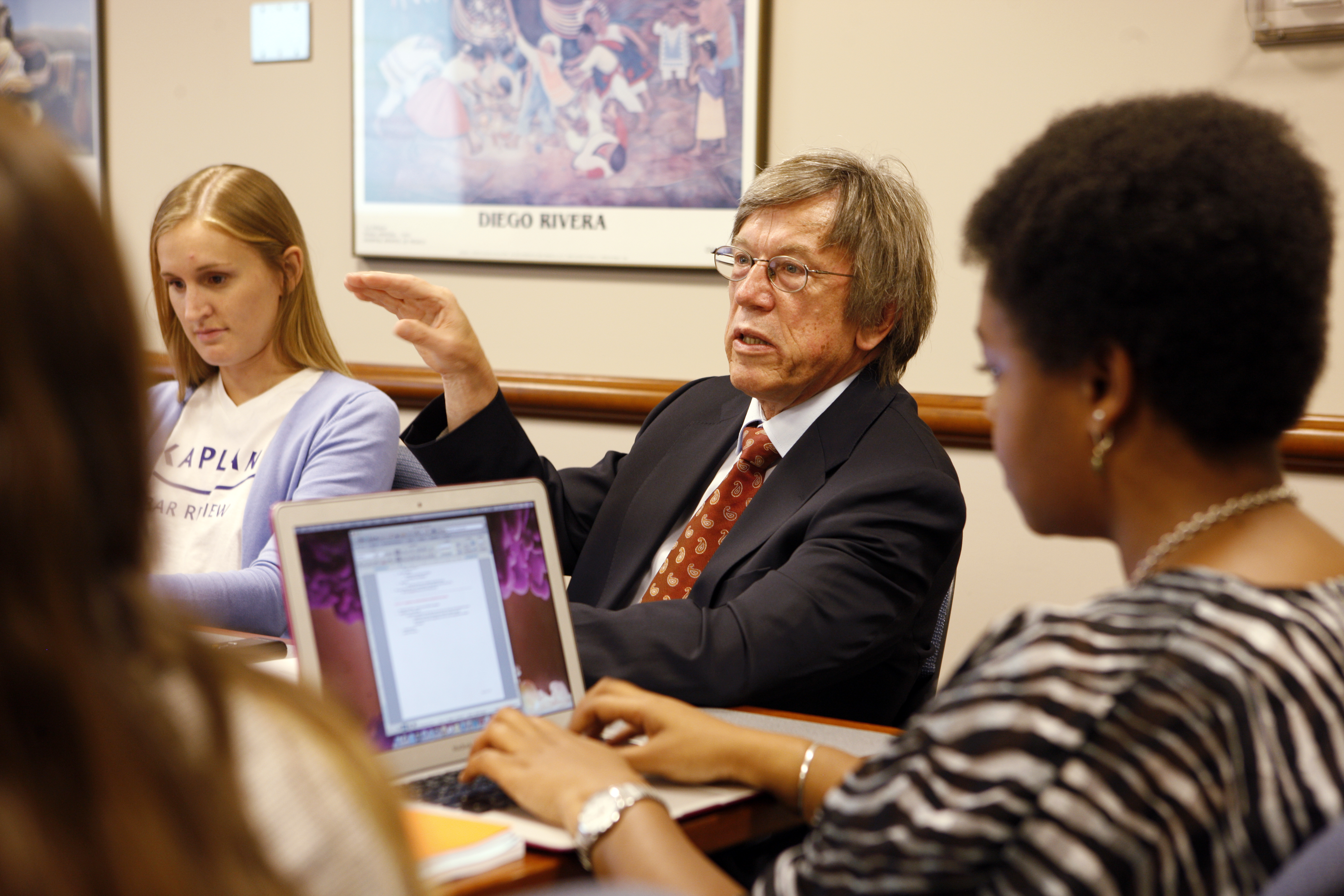Each year, an infusion of international experts who teach at the University of Virginia School of Law – from such nations as France, Germany, Australia and Israel – helps ensure that U.Va. Law graduates will thrive in an increasingly globalized market.
“I often tell students it’s not only important to specialize in areas you can apply directly, but also to be able to handle problems that are based in law that are unknown, where there are no easy solutions available,” said Hans Jarass, a visiting professor from Germany. “If you only work in your own law, you think it can only be done like that.”
Jarass, who directs the ZIR Research Institute for German and European Public Law at the University of Münster, is currently teaching “European Union Law” with Matthias Casper, a colleague at Münster. The course is part of a broader exchange program with the German university; in May, U.Va. law professors Kerry Abrams and Brandon Garrett taught a two-week course there on current issues in American law.
“My goal is not so much that students learn a lot of different facts, but that they get a feel for where European Union law differs from their own law, and how it’s similar,” Jarass said. “And if they encounter a case where European Union law is involved, they can handle that.”
International professors teach courses on current global legal trends, often from direct experience. Timothy J. McEvoy, who has taught the fall short course “Globalization and International Civil Litigation” at the Law School since 2001, currently practices international law in Melbourne, Australia.
“In my private practice as a barrister in Australia, I often advise corporations on private international law issues involving provisional and protective measures, and judgment enforcement,” said McEvoy, who was awarded an S.J.D. from U.Va. Law in 1999. “Judgment recognition, and enforcement more generally is becoming a hot topic, particularly in the U.S. in the context of the Chevron litigation. … The course is really a strong blend of the law in this area and its practical application.”
He said he hopes that his students will “take away a robust understanding of some of the traditional principles of private international law and how they apply in the context of the rapidly changing global business environment.”
Other classes, such as the fall short course “International Banking Transactions,” focus not just on how to think like an international lawyer, but also on specific obstacles law graduates may encounter.
“My class is case-study based, with a clear split between how an investment or transaction is supposed to work and what legally can go wrong,” said Christof Fritzen, a former managing director at Deutsche Bank who is teaching the course.
Fritzen said his students are typically second- and third-year students focusing on business law or current lawyers pursuing an LL.M. degree. He said he emphasizes to his students the importance of understanding the fundamentals of international banking products and transactions because they are integral to the laws governing them.
“We as lawyers don’t have enough education on the commercial side – not to mention on the math side and on reading balance sheets,” Fritzen said. “What’s your legal reason worth if you don’t know how the legal instrument is supposed to work?”
Short courses conducted abroad are also an important part of the Law School’s international education.
U.Va. law professor Gil Siegal, who lives most of the year in Israel, teaches the weeklong January Term course “Israeli Health Law and Bioethics,” which includes field trips to the Israeli Supreme Court in Jerusalem and the Chaim Sheba Medical Center near Tel Aviv. In Israel, Siegal directs the Center for Health Law and Bioethics at Kiryat Ono College, where most of the classes for the J-term course are held.
Marie Goré, a professor of law at the University Panthéon-Assas in Paris, teaches the J-term course “French Public and Private Law.” U.Va. law students who travel to France for the class learn about the origins of French law and the basics of French contracts and torts.
Second- and third-year students also may study abroad for a full semester in one of eight international exchange programs or through a dual degree at Sciences Po in Paris. They also , have the option of planning their own study-abroad ventures.
Current students say their international law classes have been a valuable form of preparation that will give them added confidence when they enter the legal workforce full-time.
“Last year, I took Justice [Richard] Goldstone’s class on the international criminal justice field, and this semester I am taking European Union Law,” said Melissa Reilly-Diakun, a third-year student who said she wants to pursue a career in international law. “Each of these classes has been valuable not just for the subject matter, but for an opportunity to explore the law from a mindset other than that of an American schooled in an American law school.”
Sam Shirazi, a second-year law student in the European Law class, agreed. “With the increasing globalized nature of business and commerce, I think learning more about different legal systems around the world is crucial for any law student,” he said.
— reported by Eric Williamson
Media Contact
Article Information
October 22, 2013
/content/visiting-professors-around-globe-bring-international-insights-uva-law

